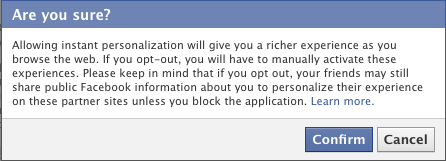 As opposed to my previous post, BBC reports an instance where the FBI has made use of public information to predict a possible threat to St Aelred’s Catholic Technology College in England. The information was on Facebook, and was available probably because the defendant hadn’t protected his postings, perhaps due to FB’s confusing approach to privacy. Imagine, however, that FB didn’t confuse anyone, and this information were protected. Would the FBI have been prevented from warning St. Aelreds? If if they couldn’t, would Facebook? And if Facebook didn’t would the FBI insist on new powers? Watch this space.
As opposed to my previous post, BBC reports an instance where the FBI has made use of public information to predict a possible threat to St Aelred’s Catholic Technology College in England. The information was on Facebook, and was available probably because the defendant hadn’t protected his postings, perhaps due to FB’s confusing approach to privacy. Imagine, however, that FB didn’t confuse anyone, and this information were protected. Would the FBI have been prevented from warning St. Aelreds? If if they couldn’t, would Facebook? And if Facebook didn’t would the FBI insist on new powers? Watch this space.
Category: Internet
Several blogs worth mentioning
Today I bring to your attention two excellent pieces of work. The first is by friend and colleague John Levine, whose books you may have read. He is in fact today writing about the eBooks industry. I have something of a personal interest in the topic, not so much because I’ve written books (I write RFCs), but because my wife wrote an excellent book, in which the publisher encouraged her to create an eBook. It was ripped off and circulating on P2P networks within days of its ePublication. How annoying. Anyway, John goes to some lengths to talk about the economics of the situation. He’s a great and incisive writer, and a pointer to his writings can now be found on my little blog roll to the right of this post on Ofcourseimright.com.
Separately, Bruce Schneier has been writing about Worst Case Thinking, and what it means to him. While I don’t agree with everything Bruce writes in that article (particularly about his nuclear example), I do agree that societies generally do an extremely poor job of risk management. To me that is because those challenging incumbent politicians always aim for the emotional side of the brain, to get people angry that Something Bad happened, and so incumbents avoid risk at all costs. To me that’s not good government. Don’t get me wrong. Some risks are not worth taking, but let’s be smart about it.
iPhone: Good or Bad for the Industry?
Take the OfCourseImRight Poll
Before Apple released the i Phone it irked me that the pace of technology for cell phones lagged at an incredibly slow pace, the user interfaces were crap, and the deal between cell phone providers and service providers seemed to completely leave the consumer out of the value chain.
Phone it irked me that the pace of technology for cell phones lagged at an incredibly slow pace, the user interfaces were crap, and the deal between cell phone providers and service providers seemed to completely leave the consumer out of the value chain.
Apple changed all of that by going “over the top”, picking a winner in each market, but limiting what deal those winners would get. That was great, and really stuck it to SPs (who got rich anyway). They’re trying to do the same thing with the iPad, but in the meantime Apple has changed the accepted development model for businesses.
It used to be that you needed rich web connectivity, and that was good enough. Now you have to have an Apple app in order to reach all of those customers who love their iPhones. Good examples of this include Facebook, Airlines, and even that dinosaur who is responsible for Formula 1 promotion, Bernie Ecclestone. Yes, even F1 has an app.
Here’s the problem: many of the Apps are nothing more than shells for garbage that companies want to shovel at you, and they don’t want others using “their data”. A perfect example is American Express, who requires an app in order to view flight reservations. THERE ALREADY ARE MANY SUCH APPS. One of them is your calendar program. One thing you might want to do is download reservation information into your calendar. But American Express‘ travel web site GetThere.Com won’t let you do it. You have to download their app.
And GetThere is getting sneakier, as they no longer send many corporate travelers a full reservation in email, but instead simply send a pointer to their web page. Why are they doing this? Because they don’t want others like TripIt to capitalize on “their” (really your) information.
And so there seems to be no incentive for these bad players to be good players in an iPhone world, in spite of the fact that there are perfectly capable standards and programs and libraries to deal with much of stuff that’s being exchanged. What can be done to change that?
Is Facebook deceiving you?
![]() Here is a really good article from the Electronic Frontier Foundation (EFF) about deceptive user interface practices. The funny thing about all of this is that people are missing the most offensive and dangerous part of Facebook’s warning:
Here is a really good article from the Electronic Frontier Foundation (EFF) about deceptive user interface practices. The funny thing about all of this is that people are missing the most offensive and dangerous part of Facebook’s warning:
So in other words, they’re going to violate your privacy no matter what you do, because your friends are going to divulge your information. Put another way, you may end up divulging your friends information. What can you do about this? Don’t share that much information with your friends. But you say, “They’re my friends!” Of course they are, and they probably already know most of the information you would share, anyway.
How to do this? Go to the following part of the site:
Privacy Settings -> Personal Information and Posts
as well as
Privacy Settings -> Friends, Tags and Connections
Then consider each category. Here comes another wingdinger: in order to keep something to yourself, either you must remove it entirely, or select “Customize” and then “Only Me.” You can’t just pull down “Only Me.”
I’m seriously considering being through with Facebook over all of this.
What are your thoughts? Take the OfcourseImRight poll.
Email: I’ve shown you mine. What about yours?
[Now updated to include the obvious missing category!]
So now you know all about my email evolution. What do you use to Email. Take the OfcourseImRight Poll. What works for you and why?

